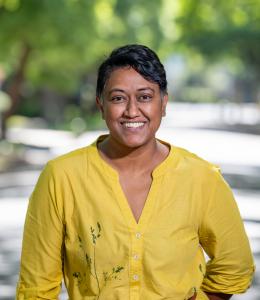
Dr Caryn Abrahams
African Fellow, November 2025 - March 2026
Home institution: University of the Witwatersrand
Caryn Abrahams is an academic based at the Wits School of Governance. Her interdisciplinary scholarship focuses on governance and state discourses, and having worked for several years in civil society, there is a distinctly justice-bent in her scholarly endeavours. Being an urban geographer by training, her interdisciplinary focus is on socio-spatial inequality and the sets of policy decision-making that can reproduce and maintain inequalities. She also publishes in the fields of urban governance and social cohesion. She completed her PhD at the University of Edinburgh (2010) based at the Centre for African Studies.
Project title: Mapping the institutional layering of governance and logics of decision-making in the state
In South Africa, the subnational government - Gauteng Province – is rolling out its first consolidation of databases of those receiving both national grants from the state and local government indigent social wage intervention for basic services. In effect this will mean that those receiving grants will be considered alongside indigent registration processes for state support through the social wage as an automatic process. This is a shift from the separation of these provisions – grants, and indigent service subsidization – which arguably reinforced inequalities and placed unfair burdens on welfare recipients. This project seeks to dissect the decision-making processes, business rules and institutional layering that will make it possible to merge the actual datasets. It also will apply an experimental design to create different data outcomes based on different assumptions and business rules, as the set of provocations emerging from the project.
The study will have enormous social and policy value: decision-making around data harmonisation is not just about administrative processes. Extending from my research on datafication and digitalisation in government, the study will raise important questions for administrative justice, business rules of automated decision-making, and big data and the state. All public decisions are steeped in questions of justice, and the specific data-decisions similarly should be reflective of progressive ideals about how authoring of evidence profoundly reveals logics of the state. Data decisions can, thus also reflect different logics where deep structural bias can potentially lead to exclusion and marginalisation. These logics are authorised, and often serve hegemonic pursuits, and political expediency. Yet, despite state discourses being so powerful, they remain largely imperceptible. My work seeks to make manifest the hidden logics of decision-making of the state, as seen in the Gauteng case. The theoretical contribution of the project is to develop arguments about discourses of the state.
